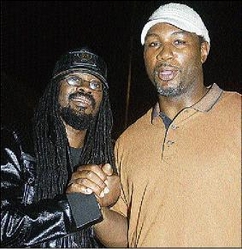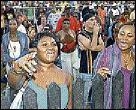The sweet sound of money
Published: Monday | September 14, 2009

Two Jamaican heavyweights, dancehall's Beenie Man (left) and former boxer Lennox Lewis, at Reggae Sumfest 2007. - file
It may just be easier for a liquidator to get a handle on how much money was in Cash Plus and other assorted high-interest schemes than on how much there is in the Jamaican music industry, even on the local level only.
However, while any number of high-interest scheme investors mull over the fate of their money, actual or simply on the books, music continues to boom even in a recession (or maybe, because of it and music's therapeutic capabilities, some will argue), literally, to the chagrin of many.
Consider this: Summerfest Productions' (which organises the annual Reggae Sumfest in Montego Bay, St James) CEO Robert Russell says they had their biggest Dancehall Night ever in their 17 years. Sixteen thousand people paid to see Beenie Man, Bounty Killer, Vybz Kartel, Assasin, Mavado and many more, plus the organisers gave away 2,000 tickets.
10,000 permits
Consider this also: between January and September last year, the authorities issued 10,000 permits, the overwhelming majority of these dancehall sessions and concerts, for entertainment events to be held. Remember, this was before the boom Christmas period and does not take into account the numerous events, from an all out session to a hopeful setting up of a few speaker boxes, a makeshift bar and a half-drum for pan chicken, that are held without permission.
And, finally, consider this: in early January the Jamaica Tourist Board (JTB) sponsored the Jamaica Jazz and Blues Festival to the tune of a whopping US$500,000 through the Tourism EnhancementFund. There was an uproar from the public about the magnitude of the sponsorship, figuratively comparable to the whoop and holler for Lionel Richie, Randy Crawford and others who performed at the Acqueduct, Rose Hall, Montego Bay.
After the festival which cost over US$2 million to produce, Tourism Minister Ed Bartlett reported that it was estimated to have generated US$10.2 million of economic activity within MoBay over its three days. The income flowed across all levels of the society and festival's support system, from airport taxes to route taxis, from hotel accommodation to the ubiquitous half drum for pan chicken.
Obviously, then, there is money in music (and this is not based solely on the 'Range' of expensive motor vehicles dancehall stars drive). At the recent launch of Beenie Man's Sizzle concert at the Plush Nightclub in New Kingston, mention was made of the range of industries which spin off the discs rotating on the turntables and in the CD players, from public address systems to makers of 'indigenous cigars'.
However, the majority of the Jamaican music industry remains below the revenue radar, with record sales, performance fees and gate receipts often kept a secret.
Avoiding the taxman
It may just be in an effort to avoid the taxman, who naturally has a hard time assessing individuals and organisations whose income is not measured and is sometimes untraceable. This, because many transactions are done on a strictly cash, no receipts and no contracts basis. And even when the tax axe does slash at the entertainment industry, the targets are as nimble in the courts as they are onstage. Beenie Man's highly publicised $47 million tax evasion case was tossed out late last year because he was not informed of his legal rights when the notice of assessment was issued.
So, it would seem, by and large, the music industry's financial contribution to the Jamaican economy will continue as it has long been; generating income in the formal but moreso informal economies and supporting those who often have no idea of what a regular payslip looks like.
Not to be ignored are the philanthropic efforts of many Jamaican entertainers, many of which are done on an individual basis and are not publicised. Through his 'St Mary Me Come From' concert, Capleton has donated a new X-Ray machine to the Port Maria Hospital, given Islington High School a computer lab and donated $500,000 to the Annotto Bay Hospital to build a waiting area for patients.
Economic growth
Richie Stephens has used is 'Take Me Away' concert to donate $1 million to the Savann-la-Mar infirmary, among many other charitable efforts. Even 'flossing' deejay Flippa Mafia announced at the recent 'Champions in Action 2009' concert that he will stop tossing cash into the crowd and is creating a foundation for charity.
Still, there are those who continue to hope that some of the tremendous financial music industry potential will spin off the turntables and CDs and really get the Jamaican economy turning, maybe doing the balance sheet equivalent of the 'Sweep' dancehall move, sweeping up the economic growth charts.
How much money is estimated to be in the industry? Consider this: Bruce Lehman, president of the International Intellectual Property Institute, suggested that the Jamaican economy could expand by 10 per cent if the country was able to capture all the earnings from Jamaican music on the world market.
Those earnings had been valued at US$1.2 billion by the United Nations Commission on Trade and Development.
Just how much comes to Jamaica is anybody's single-digit guess.

Patrons sing along with Pinchers during a performance at Sumfest in Montego Bay in July 2007. - file




















